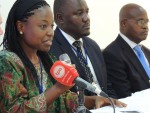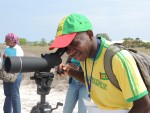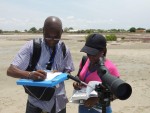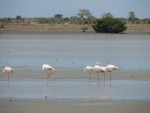Flyway Training of Trainers Workshop for Portuguese-speaking African Countries in Angola
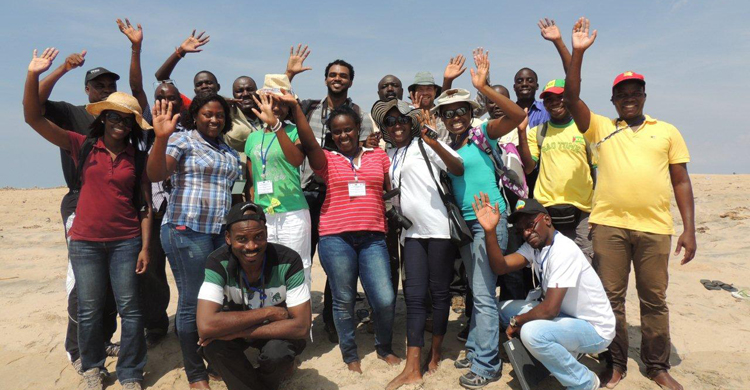
Workshop participants during the field excursion © Tim Dodman
Bonn, 31 January 2014 - A Training of Trainers (ToT) workshop on the Flyway Approach to the Conservation and Wise Use of Waterbirds and Wetlands took place in Luanda, Angola from 27 to 31 January 2014. The workshop targeted technical experts from the five African countries in which Portuguese is an official language: Angola, Cabo Verde, Guinea-Bissau, Mozambique and São Tomé and Principe. The working language of the meeting was Portuguese.
Kindly hosted by the Government of Angola, the workshop was a joint undertaking of AEWA and the Wadden Sea Flyway Initiative (WSFI), with additional support from the Common Wadden Sea Secretariat. The Wadden Sea Flyway Initiative was launched as a response to the UNESCO World Heritage Committee's decision in 2009 to include the Dutch-German Wadden Sea on the World Heritage List, recognizing the crucial importance of the site for the survival of migratory birds on a global scale.
The workshop was attended by more than twenty Angolan and international participants (including two each from Cabo Verde, Guinea-Bissau, Mozambique and São Tomé and Principe) and comprised presentations, group discussions, practical exercises and a field excursion.
After the opening session, which was presided over by Dr Soki Kuedikuenda, Director General of the Institute of Biodiversity and Protected Areas and Mr Nascimento António from the Ministry of Environment of Angola, the workshop participants plunged into a wide range of theoretical and practical training activities on various topics.
Participants were, for example, introduced to the concept of migration and site conservation and to challenges for migration and the management of protected areas. Practical exercises, such as drawing a particular species’ flyway or games illustrating various threats to migratory waterbirds, helped deepen the understanding of these concepts.
Participants also shared information and experiences on sites of importance for migratory waterbirds in their respective countries, national conservation activities and policies, and generally discussed knowledge and conservation gaps for waterbird conservation in the Portuguese-speaking African countries.
The central training resource used for this ToT workshop is the Flyway Training Kit (FTK), developed under the Wings Over Wetlands (WOW) UNEP-GEF African-Eurasian Flyways Project. The training kit is a unique resource, which consists of three modules covering the main issues of relevance for the conservation, management, awareness-raising and communication on waterbirds and wetlands. In addition, it has the distinctive feature of providing a practical framework for trainers on how to conduct workshops and deliver trainings at the national and regional level for different target audiences.
The FTK was complemented, among others, by the tool kit for waterbird counts in sub-Saharan Africa, developed by the French hunting and wildlife agency Office national de la chasse et de la faune sauvage (ONCFS). Based on this, workshop participants were introduced to bird identification and counting.
A field excursion to the Mussulo wetland on the third workshop day provided an opportunity for hands-on training in waterbird identification and counting as well as the use of binoculars, telescopes, GPS, field guides, and reporting tools. A number of waterbird species could be observed during this field trip, including AEWA species such as Lesser and Greater Flamingos, Great Cormorants, Whimbrels, African Spoonbills, Pink-backed Pelicans, Pied Avocets, Sanderlings and Little Egrets.
The ToT workshop was, in particular, intended for technical staff or affiliates of conservation, education or environmental, governmental or non-governmental organizations, who are already engaged in the design or delivery of training at some level, preferably in relation to wetlands and waterbird conservation, and who are in a position to deliver future flyway conservation training in their country.
It provided an opportunity for participants to enhance their understanding of the concepts of flyway conservation for the management of wetland resources and apply them in their respective activities. Participants are also expected to further disseminate this knowledge in their country and beyond, especially through the planning, organisation and delivery of flyway conservation courses.
The workshop aimed to promote the execution of priority activities identified in the AEWA Plan of Action for Africa 2012-2017, adopted at the 5th Session of the Meeting of Parties to AEWA. It also sought to generally benefit the conservation of migratory waterbirds and their habitats in the African region, as well as contribute to implementing the recommendations under the Dutch-German World Heritage Site designation as well as the implementation of the Ramsar Convention on Wetlands.
In addition to the support provided by the Government of Angola, through its Ministry of Environment, the workshop was made possible by a generous financial contribution from the Thematic Programme for Environment and Sustainable Management of Natural Resources including Energy (ENRTP) Strategic Cooperation Agreement between the European Commission Directorate-General for the Environment and UNEP, as well as the German Federal Ministry for the Environment, Nature Conservation and Nuclear Safety (BMU), in the framework of the Wadden Sea Flyway Initiative.
The UNEP/AEWA Secretariat would like to thank the donors, as well as all the many stakeholders, who contributed to the realisation of this ToT workshop.
Last updated on 25 February 2015



